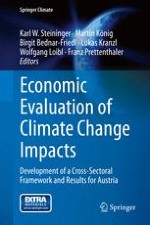2015 | OriginalPaper | Chapter
20. Assessment of the Costs up to 2100 and Barriers to Adaptation
Authors : Claudia Kettner, Angela Köppl, Katharina Köberl
Published in: Economic Evaluation of Climate Change Impacts
Publisher: Springer International Publishing
Activate our intelligent search to find suitable subject content or patents.
Select sections of text to find matching patents with Artificial Intelligence. powered by
Select sections of text to find additional relevant content using AI-assisted search. powered by
